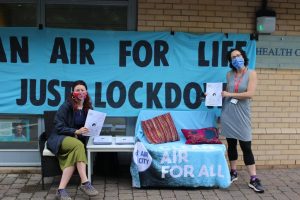With one week to go until CEM’s online event Health and the Climate Crisis on 8th February we will be running a series of guest blogs from other groups and individuals showing that the health and climate crisis are interlinked. You can sign up for our event here

Tell us about about yourself / your group. Who are you, how did you come into being, what are you trying to achieve?
We are Our Air, Our City, a cross-movement campaign pushing for clean air for Bristol. Those most impacted by dirty air are often from the disadvantaged communities who tend to be left out of environmental conversations, so we are setup so that those voices lead on our campaigning.
We came together to campaign when it was first coming to light how dirty air worsens Covid outcomes. We want Bristol’s outdoor air quality to meet WHO regulations to ensure a healthy and just city for all.What is the biggest challenge you have faced so far? And what’s been your biggest success?We began as a campaign during the first year of COVID, so there have been a lot of challenges to building a community driven campaign when we have to distance and when people have many other burdens to carry.
However, we are pleased to have found ways to work together in a distanced way, often through creativity. We were very happy to have the artist Luke Jerram create a stencil for us to create reverse graffiti, which is where you create a picture by pressure washing pollution off of pavements. We were also overwhelmed at the scale of support from the public who helped us crowdfund thousands of pounds to install billboards across the city, which raised awareness of how dirty Bristol’s air is.We were struck by your steering group, and its diversity. What voices are still missing, who would you like to involve further?
We are happy to have voices from the demographic groups that tend to be most disadvantaged by air pollution. However, the steering group does consider new groups for inclusion and we welcome join requests from any Bristol group who represents a community who is disproportionately impacted by dirty air.As you might have read, the introduction of a clean air zone has become hotly contested in Manchester. How do we stop clean air (and clean air zones) becoming part of the culture wars?
It’s a tricky issue and I’m not sure I have the full answer, though there are two angles I believe are important.
Firstly, unfortunately the most disadvantaged groups tend to suffer most from both environmental crises *and* environmental action. Plans need to be created with disadvantaged voices at the table to ensure that plans don’t create new barriers and communities own the action. Grants need to be provided to support those who will be disadvantaged to make transitions smooth and just.Secondly, communities and businesses are facing a hugely difficult time with the impact of COVID. At such a time it’s little wonder that such schemes can seem threatening. However, the research shows that there are not only huge health benefits from clean air zones but economic rewards. CBI Economics found that in the UK alone the economy could benefit to the tune of £1.6 billion each year if it were to achieve WHO guidelines. We need to get better at narrating how environmental action isn’t an attack on people’s identity and pockets, nor is it about sacrifice, but about creating a future in which we all can thrive, economically and otherwise. Let’s make our cities – our homes that we love – work for everyone.
